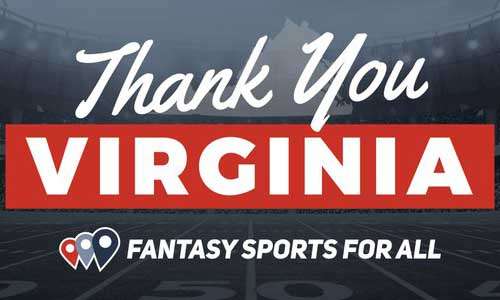Virginia Governor Signs Pro-DFS Regulation Act
Perhaps Virginia should change its state tourism slogan to “Virginia is for DFS Lovers?” On Monday, March 7th, Virginia Governor Terry McAuliffe signed the “Fantasy Contests Act,” which sets regulations for daily fantasy sports in the Commonwealth. The bill was introduced by Senator Ryan McDougle in the Senate and Delegate Jackson Miller in the House.
The act is fairly short, requiring just four pages to include all the necessary language. Daily fantasy sports will fall under the purview of the Virginia Department of Agriculture and Consumer Services (VDACS), which will be responsible for reviewing all operator applications. The act defines “fantasy contest” essentially the same way as does the Unlawful Internet Gambling Enforcement Act of 2006 (UIGEA):
Any fantasy or simulated game or contest in which
(i) the value of all prizes and awards offered to winning participants is established and made known to the participants in advance of the contest;
(ii) all winning outcomes reflect the relative knowledge and skill of the participants and are determined predominantly by accumulated statistical results of the performance of individuals, including athletes in the case of sports events; and
(iii) no winning outcome is based on the score, point spread, or any performance of any single actual team or combination of teams or solely on any single performance of an individual athlete or player in any single actual event.
The initial application fee will be $50,000; this fee can be adjusted after the first year. These fees and possible operator fines will go to a program administration fund.
Daily fantasy operators will be required to put the following types of procedures in place:
• Prevent employees and relatives of employees from playing on the site when a cash prize is offered
• Prevent the sharing of confidential information that could affect contests
• Make sure players are at least 18 years old
• Make sure that athletes participating in the games upon which the daily fantasy contests are based are unable to play in those contests (it looks like athletes can participate in contests if they are not involved in the sport)
• Allow customers to self-ban
• Set a limit, if desired, on the number of entries a player can have in a given contest, publish this limit, and prevent players from exceeding this limit
• Keep player funds segregated from operational funds
 In the “Issuance of Registration” section, it looks like DFS operators don’t have to suddenly cease operations in Virginia now that the law is in place, but they may have to get the licensing paperwork going. A clause in the section states, “Any operator applying for registration or renewal of a registration may operate during the application period unless the Department has reasonable cause to believe that such operator is or may be in violation of the provisions of this chapter and the Department requires such operator to suspend the operation of any fantasy contest until registration or renewal of registration is issued.”
In the “Issuance of Registration” section, it looks like DFS operators don’t have to suddenly cease operations in Virginia now that the law is in place, but they may have to get the licensing paperwork going. A clause in the section states, “Any operator applying for registration or renewal of a registration may operate during the application period unless the Department has reasonable cause to believe that such operator is or may be in violation of the provisions of this chapter and the Department requires such operator to suspend the operation of any fantasy contest until registration or renewal of registration is issued.”
The Act requires VDACS to issue a license to an operator within 60 days of when the operator submits its application. If VDACS does not, it must explain to the operator the reasons why.
FanDuel, one of the two leading companies in the daily fantasy sports industry, posted a press release about the new law. That press release actually quoted Griffin Finan, Director of Public Affairs for DraftKings, who said, “Today, Virginia became the first state in the nation this year to put in place a thoughtful and appropriate regulatory framework to protect the rights of fantasy players. We thank Governor McAuliffe for his leadership and advocacy and are hopeful that other states across the country will follow Virginia’s lead.”
Cory Fox, Counsel for Policy and Government Affairs for FanDuel, added, “Governor McAuliffe and members of the Virginia legislature took a thoughtful, deliberative approach to establishing a law that safeguards fantasy sports while installing consumer protections. Virginia showed real leadership in being the first state to pass smart regulations this year and we hope to see more states follow Virginia’s lead in the months ahead.”
Senator McDougle, the Act’s lead sponsor in the Senate, had this to say:
This is an important day for the future of fantasy sports. Virginia is leading the way in establishing strong consumer protections while sending a clear message that, with the proper oversight, playing fantasy sports is a skill-based hobby people should be allowed to enjoy. Although it is already legal to play fantasy sports in Virginia, this legislation provides additional consumer safeguards. I am that pleased Virginia is the first state to regulate fantasy sports sites, allowing Virginians to continue playing the games they love.



















COMMENTS